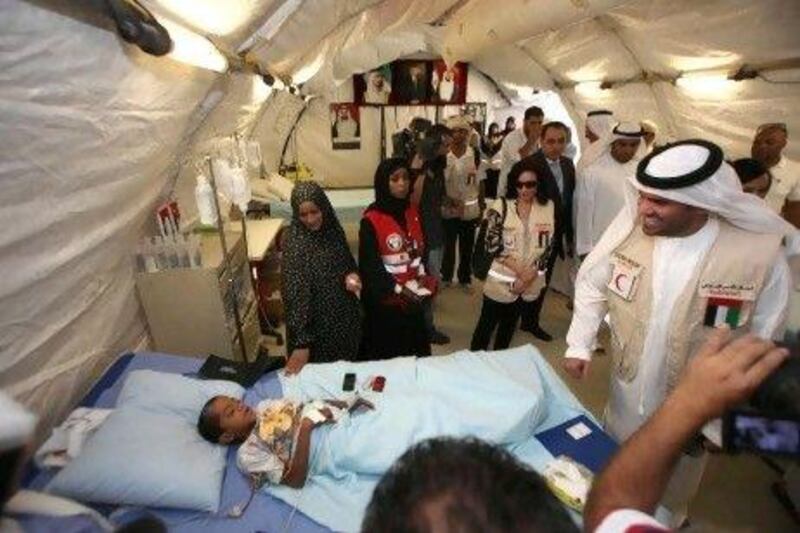MAFRAQ, JORDAN // One victim arrived with a bullet in his head. Another was paralysed from the waist down by a bullet lodged in his spinal cord. Many have war wounds that have festered for months.
As the bloody civil war that has claimed 23,000 lives rages just across the border in Syria, Emirati medical staff have treated more than 7,000 refugees from the conflict at a special centre in Jordan.
The Emirati-Jordanian Field Hospital in Mafraq has cared for up to 600 patients a day since it opened on August 28.
Early yesterday its dozen or so tents were packed with sick and wounded men, women and children, as emergency sirens wailed almost every hour.
Patients undergo a preliminary assessment by doctors, and are referred to specialists if required. Cases range from simple flu to serious war wounds.
Some victims have had bullets in their bodies for weeks, even three months. "It depends on how long it took them to leave Syria and get to the hospital," said Majid Sulaiman, head of the UAE relief team. "That is why the bullets stayed in their bodies for so long."
But amid the pain, there is joy too. Doctors have helped two mothers to give birth to healthy babies. The first, a little girl born last Thursday, was named Fatima after Sheikha Fatima bint Mubarak, widow of the UAE's founder Sheikh Zayed.
Some of the wounds the doctors are coping have been made worse because they were inexpertly treated by civilians, causing potentially fatal infections. One man came to them with a leg held together by makeshift metal rods, and they were unable to save the limb.
Several Syrian doctors who fled with the refugees are assisting the UAE team, but remain in fear of retribution by the Assad regime against relatives still in Syria.
The hospital also provides psychological support for families and children through play therapy and education. One of the tents is reserved for children to study, but officials stress it is not a replacement for school.
"After the refugees go through all that trouble and reach the camp, they find it difficult to leave their children behind in the camp while they come to the hospital and get treatment, so they bring their children with them and we try to keep them occupied," said Dr Khalid Al Saadi, the Emirati head of the hospital. "This also helps the parents psychologically when they see their children smiling and playing."
The hospital has operated on 80 patients, many of whom are moved to other hospitals near by when their condition has stabilised.
Local residents have also sought out the hospital, which affects the number of Syrian refugees it can handle. Some Jordanians have pretended to be Syrians to obtain medical treatment.
Mr Sulaiman said the hospital would not reject any patient - of the 8,900 they have treated, up to 20 per cent were Jordanian - but they refuse to operate on Jordanians because their priority must be the refugees.
In the past few days, 18 tonnes of medicines for the refugees have been donated by the Khalifa bin Zayed Al Nahyan Humanitarian Foundation.
Medication is provided free to patients, but only a two-week supply can be given to family members to pass to relatives. After that, they must visit the hospital personally so doctors can check up on them.
The UAE ambassador to Jordan, Dr Abdullah Nasser Al Ameri, and the Emirati singer Hussain Al Jassemi, a United Nations Goodwill Ambassador, visited the hospital yesterday and spoke to the patients.






